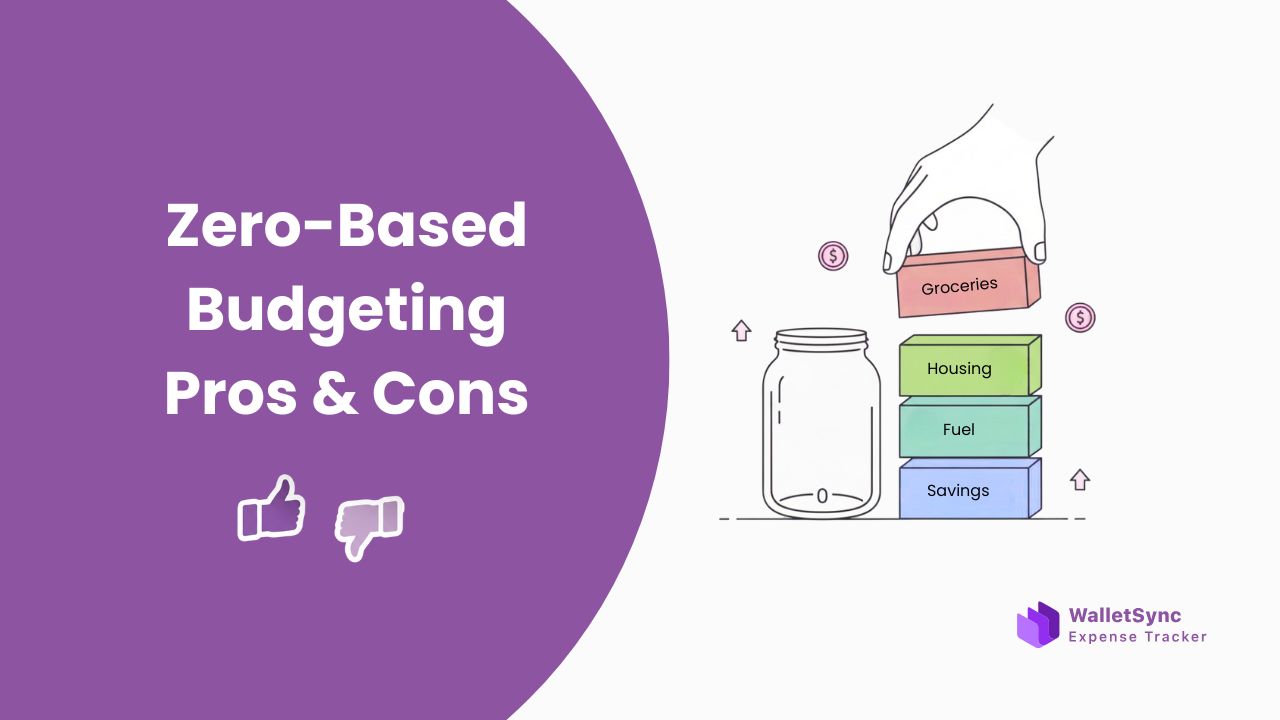Zero-Based Budgeting (ZBB) is more than just a financial technique. It is a philosophy of starting fresh every budgeting cycle. Instead of rolling over last year’s budget and adjusting it slightly, ZBB requires you to justify every single expense from scratch.
This approach is popular among businesses seeking efficiency and individuals looking for complete control over their money. Like any method, it has its strengths and weaknesses.
In this article, we will take a deep dive into the advantages and disadvantages of Zero-Based Budgeting, with real-world context and practical examples to help you decide whether it is the right choice for your financial situation.
Advantages of Zero-Based Budgeting
Zero-Based Budgeting provides multiple benefits that help both individuals and organizations manage finances more effectively. By justifying every dollar, ZBB minimizes waste, maximizes resources, and aligns spending with strategic goals. Below are the main advantages of Zero-Based Budgeting.
1. Cost Efficiency and Resource Optimization
At its core, ZBB eliminates waste. Because you are not simply carrying forward last year’s numbers, you are forced to question whether each expense is truly necessary.
Example:
- In business: A company may discover that a recurring software subscription is not being used. By removing it, they free up funds for higher-value initiatives.
- In personal finance: An individual might realize they are still paying for a gym membership they do not use. By cutting it, they can redirect that money toward debt repayment or savings.
This ongoing reassessment ensures resources are channeled only into activities that deliver measurable value.
2. Alignment with Strategic Goals
Traditional budgeting often leads to inertia. Money is spent simply because it was spent last year. ZBB, however, aligns each dollar with current priorities.
Why this matters:
- For organizations, it ensures that budgets support key strategic objectives such as launching a new product or expanding into a new market.
- For individuals, it allows every expense to reflect personal values and goals, such as saving for a home, building an emergency fund, or traveling more often.
With ZBB, your spending becomes a strategic tool, not just an administrative exercise.
3. Eliminates Budget Creep
Budget creep happens when expenses slowly increase year after year, often unnoticed. Departments might pad their numbers to avoid future cuts, or individuals may add small recurring costs without realizing their impact.
Because ZBB wipes the slate clean each cycle, it prevents this creep. Every item must be justified again, meaning unjustified costs do not carry forward by default.
Example: A marketing department cannot simply roll over last year’s inflated ad budget. They must demonstrate why the same amount (or more) is needed again.
4. Flexibility and Adaptability
ZBB is inherently flexible because it does not rely on history. Instead, it adapts to changing circumstances.
- For companies: This means budgets can respond quickly to market shifts, new technologies, or sudden challenges. For example, during an economic downturn, ZBB helps organizations reallocate funds toward survival strategies rather than outdated priorities.
- For individuals: Someone who recently paid off debt can reset their budget and allocate freed-up money toward investments, travel, or other goals without being tied to old patterns.
In short, ZBB gives you the freedom to reset priorities whenever needed.
5. Encourages Accountability and Transparency
Because every expense must be defended, ZBB fosters a culture of accountability.
- For businesses: Department managers cannot hide behind blanket line items. They must explain why they need a specific budget and how it supports company goals. This transparency can also improve trust among stakeholders and investors.
- For households: Family members become more conscious of spending decisions, leading to better communication and shared responsibility.
These benefits of zero-based budgeting demonstrate why many organizations and individuals adopt this approach.
Disadvantages of Zero-Based Budgeting
Despite its benefits, zero-based budgeting is not without challenges. Implementing this method requires effort, consistency, and discipline, which can make it difficult for some people to maintain over time. Understanding the limitations of zero-based budgeting is essential before implementing it.
1. Time-Consuming Process
The biggest drawback of ZBB is the time it takes to implement. Unlike traditional budgets, which may only need minor adjustments, ZBB requires a detailed review of every expense cycle after cycle.
- In organizations: This means finance teams and managers spend more hours preparing budgets, reviewing justifications, and reallocating resources.
- In personal finance: Individuals may find the constant analysis exhausting, especially if they prefer a simpler, low-maintenance system.
For some, the benefits do not outweigh the time cost.
2. Complex Implementation in Large Organizations
ZBB can be straightforward for individuals or small businesses, but in large organizations, the complexity increases dramatically.
With multiple departments, cost centers, and projects, gathering justifications for every single expense can feel overwhelming. Without the right software or systems in place, ZBB may bog down the budgeting process instead of streamlining it.
This complexity is one reason many corporations adopt ZBB only during times of crisis when the payoff is more urgent.
3. Risk of Short-Term Focus
Because ZBB demands constant justification, managers may prioritize short-term savings over long-term growth.
Example:
- A company might cut training programs to save money immediately, but this could hurt employee development and innovation in the future.
- An individual might eliminate leisure or wellness expenses, saving money now but harming quality of life and health in the long run.
This short-term bias can undermine the sustainability of an organization or a household’s financial well-being.
4. Employee or Household Resistance
ZBB often requires cultural change, which is not always easy.
- In companies: Employees may feel threatened if their budget requests are constantly under scrutiny. This can create resistance, lower morale, and even lead to conflict between departments.
- In households: Family members may push back against the perceived restrictions of ZBB, especially if they are used to more flexible spending.
Overcoming this resistance requires clear communication and a focus on shared goals.
5. Resource Strain
Finally, ZBB can strain resources. It requires skilled people who can analyze expenses critically, robust systems to track and manage budgets, and sometimes new software tools.
For individuals, it demands ongoing discipline and attention to detail. Without these resources, ZBB can become impractical or unsustainable over time.
These points summarize the zero-based budgeting disadvantages and highlight the effort required to implement this method effectively.
Who Should Use Zero-Based Budgeting
Zero-Based Budgeting is most effective when applied in situations that demand careful allocation of resources and a focus on efficiency. Understanding who benefits most can help you decide if this budgeting method is right for you.
Best Suited For:
- Organizations under cost pressure or restructuring
- Agile startups and small businesses
- Individuals seeking full control of their finances
Not Ideal For:
- Large, bureaucratic organizations
- People who prefer simple, low-maintenance budgets
- Situations requiring long-term, consistent funding
Conclusion
Zero-Based Budgeting offers a clear framework for financial efficiency, accountability, and strategic spending. By understanding the zero-based budgeting pros and cons, both businesses and individuals can weigh the advantages against the limitations to determine if this method meets their needs.
For those who value precision and want every dollar to be purposeful, ZBB can transform personal and organizational budgeting. For those seeking simplicity or lacking resources, a hybrid or traditional approach may be more suitable.

